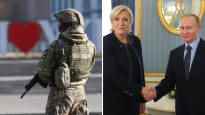Does Vladimir take anything from Putin’s calls to his hearing ears? The Europe Letter covers key EU issues every Friday. You can order the entire letter to your email.
Annastiina Heikkilä,
Janne Toivonen
In May 2017, the newly elected President of France Emmanuel Macron received the President of Russia at the Palace of Versailles Vladimir Putin. I watched a historic meeting and I remember the hopeful atmosphere.
Putin admired the memorial exhibition of Peter the Great, which opened in the palace, and recalled the common history of France and Russia. Smiling Macron spoke of “Russia opening up to Europe” and “Franco-Russian friendship.”
Now that vibe feels distant and Macron’s words are almost silly.
THE PUT IS NO LONGER A friend of France but a war criminal killing civilians. French politicians have resigned from Russia.
Something has also remained: President Macron’s attempts to maintain a dialogue. Macron has spoken to Putin on the phone at least twelve times in the past month, more often than any other head of state.
The Élysée Palace has reported exceptionally accurately on the content of the calls – and the announcements do reflect Macron’s perseverance.
FREQUENTLY ASKED IN FRANCE, does the call make sense. Macron has failed to influence Putin’s decisions, and Putin has largely reiterated his misconceptions about the crimes committed by the Ukrainians.
At times, Putin has seemed to almost mock Macron.
However, Marcon has confirmed that he will continue to communicate. Macron declined the call (switch to another service) Putin as dictator in an interview with TF1. Macron justified this on the grounds that he “wants to keep the negotiating channels open” and that the use of the word dictator would not facilitate discussions.
President of the United States Joe Biden instead, he called Putin a war criminal this week.
ONKO MACRON admirably tenacious or unnecessarily bona fide? It is now being asked elsewhere in Europe, as France, as the EU presidency and military power, has a great responsibility.
At least Macron has boldly put himself in the game, as there is a high risk of failure in the negotiations. Domestic political risks are also high due to the forthcoming presidential election.
France’s relationship with Russia has always been close. It is explained by the long cultural, historical and economic ties that have led to Russia being listened to and hitherto respected.
Now the relationship needs to be rethought. Macron has taken on the role of negotiator and I believe he has shown European leadership.
A quiet weekend for readers of the European letter, Bon weekend,
Then a week on the main news topics in Europe. They have been put together by my colleague, ‘s economic journalist following the EU Janne Toivonen. A condensed version will be published on ‘s website. You can order the entire letter here (you will switch to another service).
Next week: The calendar is full of crisis, Biden arrives in Europe
The first official EU summit of the year will take place on Thursday and Friday in Brussels. There will be war and crowns on the desk of EU leaders, among others, and US President Joe Biden is expected to be a guest.
EU defense and foreign ministers will also meet on Russia on Monday, and an extraordinary NATO summit will be held on Thursday, with Biden also attending.
The Council of Europe, from which Russia has just kicked itself out or was kicked out, will meet in Strasbourg from Tuesday to Thursday on issues such as the war on human rights. The non-EU organization for co-operation and human rights had 46 members.
You can discuss the content of the letter from the link below. The debate will be open until 23:00 tomorrow Saturday.
